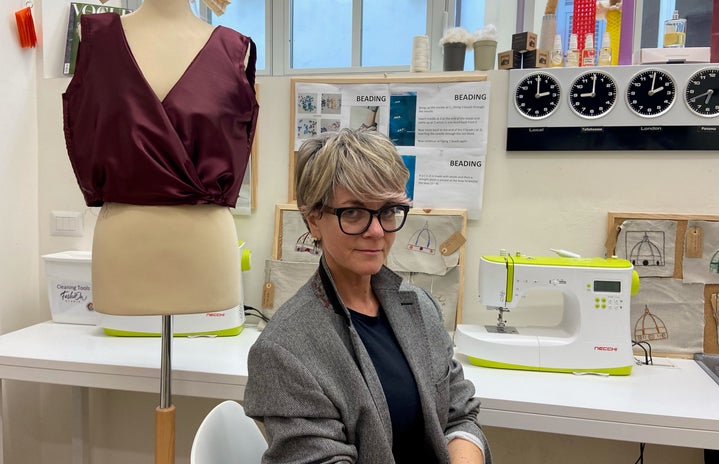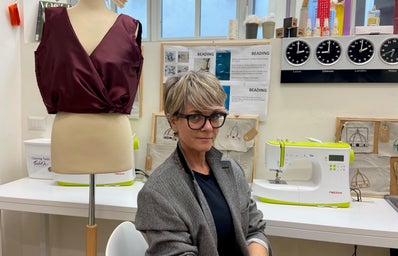At Florida State University Florence, Italy, students can enroll in Textile Sciences with Fashion Merchandising and Communication Program Coordinator Professor Costanza Menchi. Students learn about recognizing textiles, certification and sustainability all while creating masterful works. In her 15th year teaching with FSU Florence, she is bringing new light to the program not just in her class, but with the Italianoles magazine, textiles exhibition and a charity market.
“I realized that the paintings and the sculptures used to wear costumes. And this is when I started being interested in costumes as a way to communicate,” said Menchi. She first studied art history in Florence, and it was here that she was inspired to pursue textiles. After graduating, she went into studying costumes, fashion and their history before she moved to America where fashion studies were more developed in the 1990s and 2000s. Menchi continued her education and received a second degree from Middlebury College in Vermont where she studied culture and communication.
“Then I went around the world doing research because I’ve always been interested in the relationship between the language of what we wear and the language of visual arts.” Her journeys led her back to Italy and she looked into teaching in 2007. “That’s the moment when FSU told me, ‘Come with us.’ And I said, ‘Va bene, I come with you.’”
Staying in Florence seemed like the obvious choice for Menchi. There are endless sources of inspiration and materials throughout and just outside the city. One of the most important textile districts in the world, Prato, Italy, neighbors Florence. “I was in the Uffizi Gallery just last week doing some research and again, I’m totally amazed by the beauty of the colors and the shapes, the silhouette of these costumes.”
Besides her Textile Sciences course at FSU, Menchi is also one of the directors for the Italianoles magazine, a student-written publication highlighting their once-in-a-lifetime experiences in Florence. She has been involved with Italianoles since its inception in 2018, working in collaboration with FSU International Programs and the FSU School of Communications. This semester’s edition will be released in two weeks, click here to view past publications.
This week, Menchi and her Textiles Sciences class will be debuting their textiles exhibition, featuring handmade pieces from the students and sponsor artisans. Sustainability is one of the main objectives in the Textiles Sciences, which is being highlighted in the exhibition. “The exhibition is going to celebrate the use of yarns that come from old clothes, so old clothes can have a new life if you give them the opportunity to have a new life,” said Menchi, “this is what happens in the textile district we have close to Florence.”
In the vein of sustainability, FSU Florence has partnered with Florentine artisans and brands that emphasize sustainability in their production. This semester, they have partnered with Nova Fides, Laura Biagini Tessitrice and Cariatide Embroidery, who have gifted materials and presented lectures for the students to use for the exhibition. This way, students not only learn about sustainability but also use the materials in class for projects. If you are in Florence, check out the exhibition from Dec. 7 to the end of the semester.
Menchi organized for the conclusion of the semester a charity market where students and others in the community donated items to be sold. All proceeds from the market are being donated to the nonprofit organization Made in Sipario which provides jobs to Italians with intellectual disabilities or vulnerable situations. Not only is the market donating to a good cause, but it is using the sustainability of donated clothing to drive sales.
Professor Costanza Menchi is an artistic inspiration to all she interacts with. For those interested in textiles, “My advice is going to see the production…it’s really, really important to track the journey of the materials you are using in fashion. I believe a lot in the learning-through-experience approach, which I try to use in the classroom. I believe that also for designers, for everyone who wants to work in a responsible way in this industry, follow this direction to make a change. It’s super important to know where the materials come from and to be able to certify, to be able to keep track of the production and origins of the materials.” said Menchi, “In this way it takes time, but definitely the final product will be really special and that’s what I believe is important in this historic moment. I’m curious to see what will happen in the future.”
Want to see more HCFSU? Be sure to like us on Facebook and follow us on Instagram, Twitter, TikTok, YouTube and Pinterest!


